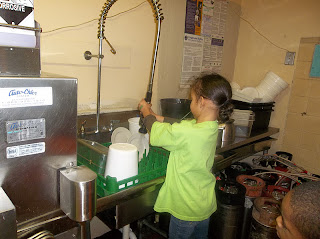Last week, I attended a Robert Burns Supper, sponsored by our local Scottish Society. My husband, daughter and three grandchildren also attended. The grandchildren experienced traditional Scottish food and music. They listened to some of the poetry of Robert Burns and learned about his life.
Bella, fourteen months old, enjoyed the music and the Scottish cuisine.
The youngest generation in our family is learning from their elders to celebrate and embrace cultural diversity, and we hope they will continue this family tradition in future generations.
Peter enjoyed the Potato-Turnip Scottish soup, but he did not care for the Haggis-flavored beef. The people at our table were surprised to see that the children were willing to try everything on their plate.
We’re hoping that by cultivating an interest in cultures other than their own, the children will learn to respect and embrace diversity. This will not only enrich their lives, it will also serve them well when they are adults who have learned to be comfortable in the presence of people from different backgrounds.
Ceci is demonstrating her own version of a Scottish dance.
Katherine Generaux, Community Incllusion




























